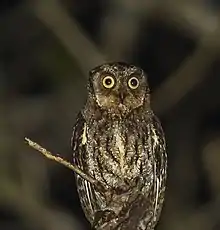| Moluccan scops owl | |
|---|---|
 | |
| Scientific classification | |
| Domain: | Eukaryota |
| Kingdom: | Animalia |
| Phylum: | Chordata |
| Class: | Aves |
| Order: | Strigiformes |
| Family: | Strigidae |
| Genus: | Otus |
| Species: | O. magicus |
| Binomial name | |
| Otus magicus (Müller, 1841) | |
The Moluccan scops owl (Otus magicus) is an owl found in the Maluku and Lesser Sunda Islands of Indonesia. It closely resembles the Rinjani scops owl.
The following subspecies are recognised:[3]
- O. m. kalidupae (Hartert, EJO, 1903) - Kaledupa
- O. m. morotensis (Sharpe, 1875) - Morotai
- O. m. leucospilus (Gray, GR, 1861) - Halmahera, Ternate, Kasiruta, and Bacan
- O. m. obira Jany, 1955 - Obi
- O. m. bouruensis (Sharpe, 1875) - Buru
- O. m. magicus (Müller, S, 1841) - Seram and Ambon
- O. m. albiventris (Sharpe, 1875) - west-central Lesser Sundas
The Wetar scops owl (O. tempestatis) was previously considered a subspecies, but has since been split.[4]
It has spiritual significance to the Pesaguan Dayak people. It is believed to be a sign of misfortune, as its sound is said to be reminiscent of death. This belief may protect the species from being hunted.[5]
References
- ↑ BirdLife International (2016). "Otus magicus". IUCN Red List of Threatened Species. 2016: e.T45400973A95147236. doi:10.2305/IUCN.UK.2016-3.RLTS.T45400973A95147236.en. Retrieved 13 November 2021.
- ↑ "Appendices | CITES". cites.org. Retrieved 2022-01-14.
- ↑ "Owls – IOC World Bird List". www.worldbirdnames.org. Retrieved 2023-01-28.
- ↑ "IOC World Bird List 12.1". IOC World Bird List Datasets. doi:10.14344/ioc.ml.12.1. Retrieved 2022-01-29.
- ↑ Erwinsyah, Erwinsyah; Due, Rufina (2022-09-06). "Ethnobiology of the Pesaguan Dayak Tribe as a Science and Biology Learning Resource". Aquademia. 6 (2): ep22010. doi:10.30935/aquademia/12427. ISSN 2542-4874.
This article is issued from Wikipedia. The text is licensed under Creative Commons - Attribution - Sharealike. Additional terms may apply for the media files.
